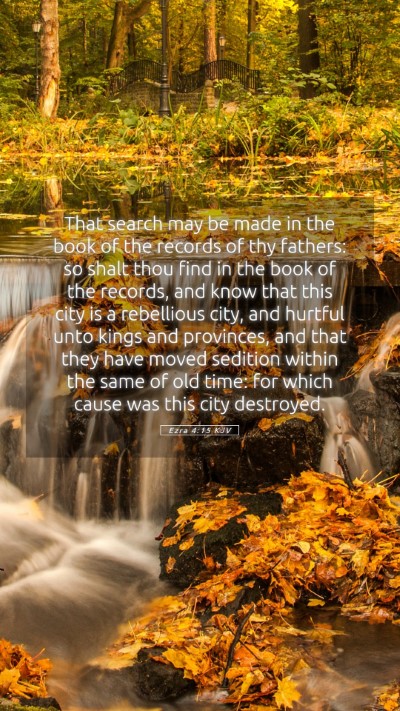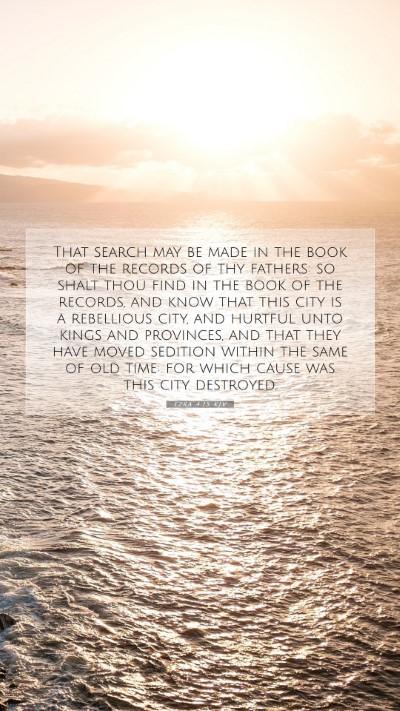Old Testament
Genesis Exodus Leviticus Numbers Deuteronomy Joshua Judges Ruth 1 Samuel 2 Samuel 1 Kings 2 Kings 1 Chronicles 2 Chronicles Ezra Nehemiah Esther Job Psalms Proverbs Ecclesiastes Song of Solomon Isaiah Jeremiah Lamentations Ezekiel Daniel Hosea Joel Amos Obadiah Jonah Micah Nahum Habakkuk Zephaniah Haggai Zechariah MalachiEzra 4:15 Meaning
What is the meaning of Ezra 4:15?
That search may be made in the book of the records of thy fathers: so shalt thou find in the book of the records, and know that this city is a rebellious city, and hurtful unto kings and provinces, and that they have moved sedition within the same of old time: for which cause was this city destroyed.
Ezra 4:15 Bible Verse Meaning
Understanding Ezra 4:15 - Commentary and Interpretation
ezra 4:15 states:
"That search may be made in the book of the records of thy fathers: so shalt thou find in the book of the chronicles, and know that this city is a rebellious city, and hurtful unto kings and provinces, and have incited sedition within the same of old time: for which cause was this city destroyed."
Overview of Ezra 4:15
This verse occurs in a context where the adversaries of the Jews were attempting to discourage them from rebuilding the temple in Jerusalem. The opponents reference historical records to portray Jerusalem as a city of rebellion against the authority of the kings.
Commentary Insights
-
Matthew Henry's Commentary:
Henry emphasizes the historical approach of the enemies of the Jews, who sought to undermine their efforts by leaning on the past failures revealed in the records. The mention of rebellion affirms that the past weighs heavily over the present, illustrating the dangers of historical memory when misused for political motives.
-
Albert Barnes' Notes:
Barnes notes that the phrase "search may be made" implies a formal inquiry, suggesting a strategy employed by adversaries to invoke previous insurrections. This tactic demonstrates the significance of what is recorded in history and how it can be employed as a weapon against one's ambitions.
-
Adam Clarke's Commentary:
Clarke dives into the meaning of the “rebellious city,” explaining how the past actions of the city's inhabitants were cited as a warning. He suggests that this commentary serves a dual purpose: it reflects on Jerusalem's history while simultaneously dissuading the Jews from their current project of rebuilding.
Historical Context
Ezra was a priest and scribe who led the return of Jews from Babylonian captivity with the objective of rebuilding the temple and restoring worship in Jerusalem. The reference to a “rebellious city” illustrates that ancient Jerusalem had a contentious relationship with surrounding powers, a fact recorded in both historical documents and scripture.
Thematic Elements in Ezra 4:15
-
Historical Records:
The verse reflects the importance of historical records and their role in shaping contemporary actions. The history of rebellion informs present perceptions, showcasing how one’s past can have lingering effects.
-
Opposition:
Opposition to God’s work is a recurrent theme in the Bible. The adversaries' tactics expose the spiritual warfare underlying the physical rebuilding of the temple.
-
Significance of Rebuilding:
Ezra 4:15 underscores the significance of the Jews' mission. Rebuilding the temple was not merely a physical task; it bore enormous spiritual implications, one that the enemies sought to thwart through discouragement.
Applications of Ezra 4:15
The lessons from Ezra 4:15 are profound for personal and communal aspects of life, teaching how to deal with opposition and the significance of learning from history while moving towards divine purposes.
-
Resilience in Adversity:
Like the Jews, individuals may encounter opposition when pursuing a righteous cause. This verse encourages perseverance even when confronted by those who would doubt or discourage.
-
Importance of Accountability:
Understanding one's history is vital. This verse reminds believers to acknowledge past mistakes without being defined by them, thus promoting growth and reconciliation.
-
Seeking Truth:
The call for a search in the records emphasizes the importance of truth and transparency. It is crucial to remain grounded in historical reality while navigating faith and actions.
Related Bible Cross References
- Nehemiah 2:17: Nehemiah's call to action encourages rebuilding amidst opposition.
- Ezra 3:12-13: This passage highlights the mixed response to the rebuilding of the temple.
- Isaiah 53:3: The concept of being despised and rejected connects with how the Jews faced opposition.
Conclusion
Ezra 4:15 serves as an important reminder of the challenges faced in restoring faith and community. Understanding this verse through scripture analysis illuminates key themes such as resilience, historical awareness, and the significance of divine pursuits despite opposition. Engage with this verse and its commentary for deeper biblical exegesis, enabling richer Bible study resources, tools, and ultimately fostering a greater understanding of Scripture.


